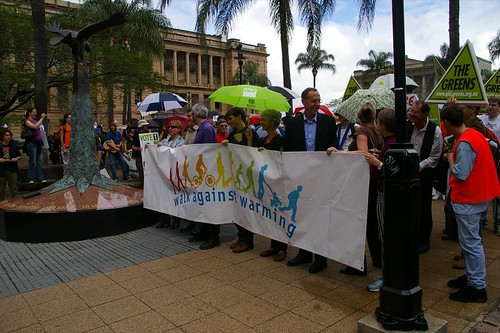If Tesco and Wal-Mart are friends of the earth, are there any enemies left?
The superstores compete to convince us they are greener than their rivals, but they are locked into unsustainable growth
George Monbiot
Tuesday January 23, 2007
The Guardian
You batter your head against the door until you begin to wonder whether it is a door at all. Suddenly it opens, and you find yourself flying through space. The superstores' green conversion is astonishing, wonderful, disorientating. If Tesco and Wal-Mart have become friends of the earth, are there any enemies left?
These were the most arrogant of the behemoths. They have trampled their suppliers, their competitors and even their regulators. They have smashed local economies, broken the backs of the farmers, forced their contractors to drive down wages, shrugged off complaints with a superciliousness born of the knowledge that they were unchallengeable. For them, it seemed, there was no law beyond the market, no place too precious to be destroyed, no cost they could not pass on to someone else.
We environmentalists developed a picture of the world that seemed to be repeatedly confirmed by experience. Big corporations destroy the environment. They are the enemies of society. The bigger they become, the less they can be constrained by democracy or consumer power. The politics of scale permit them to bully governments, tear up standards, and reshape the world to suit them. We also recognised that this was a dialectical process. As businesses began to operate globally, so could the campaigns against them. By improving global communications and ensuring that we could all speak their language, they helped us to confront them more effectively.
But hardly anyone believed that change could happen so fast. Through the 80s and 90s, they brushed us off like dust. Then, as a result of powerful campaigns against sweatshops in the US and Europe, some of the big clothing and sports retailers broke ranks. Soon after that, the energy companies started announcing big investments in renewable technologies (though not, unfortunately, any corresponding disinvestments in fossil fuel). But the supermarkets have shifted faster than anyone else. Environmental campaigners are partly responsible (listen to how the superstore bosses keep name-checking the green pressure groups); even so, their sudden conversion leaves us reeling.
...
Read the article.





No comments:
Post a Comment